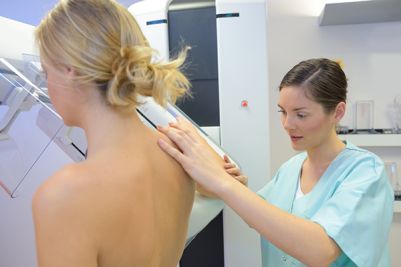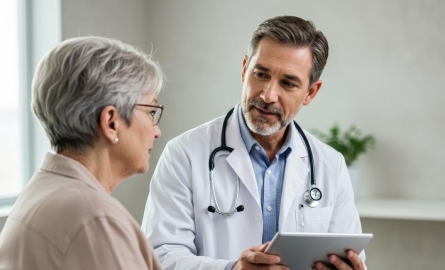
Risk Factors of Breast Cancer
 According to the National Cancer Institute, women in the United States have a one in eight risks of developing breast cancer during their lifetimes. Unfortunately, there is no way to completely prevent breast cancer, but there are steps you can take to reduce your risks.
According to the National Cancer Institute, women in the United States have a one in eight risks of developing breast cancer during their lifetimes. Unfortunately, there is no way to completely prevent breast cancer, but there are steps you can take to reduce your risks.
Risk Factors for Breast Cancer You Can Control
Some of the biggest breast cancer risks are lifestyle-related. This means they involve personal behaviors and the choices you make. If you're concerned about developing breast cancer, you can make changes to reduce your risk. Below are common lifestyle risk factors – and how you can reduce them.
- Alcohol consumption. The more alcohol you drink, the higher your risk of developing breast cancer. To reduce your risk, the American Cancer Society recommends consuming a maximum of one alcoholic beverage per day (For women: 12 ounces of beer, 5 ounces of wine, or 1.5 ounces of liquor).
- Weight. Excess body fat is associated with increased blood insulin levels and increased estrogen levels in women – both of which have been associated with breast cancer. If you're overweight, work to change that by eating reasonable portions of healthy foods and increasing your physical activity. Talk to your doctor about what is a good plan for you.
- Birth control. Oral contraceptives have been linked to a slightly higher risk of developing breast cancer. To reduce this risk, consider other forms of contraception (such as IUD or condoms).
Additionally, according to the American Cancer Society, women who have a baby before age 30 and women who have multiple children have a slightly lower risk of breast cancer. If you give birth at any age, breastfeeding your baby for at least a year can reduce your risk of developing breast cancer, according to the National Cancer Institute.
Uncontrollable Risk Factors for Breast Cancer
Some breast cancer risk factors are genetic (inherited), meaning you were born with them. These include:
- Gender. Women are 100 times more likely than men to develop breast cancer.
- Age. Women ages 55 and older have the highest risk of developing invasive breast cancer.
- Dense breast tissue. This makes it more difficult to detect cancer on a mammogram.
- Inherited gene mutations
- A family history of breast cancer. If any women in your immediate family have been diagnosed with breast cancer, you should learn more about the genetics of breast cancer and consider if genetic testing should be done to determine if you are at a higher risk of developing breast cancer.
- Personal history of breast cancer. If you have had breast cancer previously, you're more likely to develop it again.
Even if you possess one or more risk factors for breast cancer, knowing you're at heightened risk is beneficial. You can take charge of your health by making sure to have regular breast cancer screenings. If you develop the disease, the earlier it's detected, the better the likelihood of a positive outcome.
Related reading: 5 Ways to Reduce Your Breast Cancer Risk When You're BRCA-Positive
Breast Cancer Detection and Diagnosis
If you feel you may have a greater risk of developing breast cancer due to lifestyle choices, consider discussing with your primary doctor about the things you can control. If you think you are at higher risk due to genetic traits, schedule a consultation with a genetic counselor at Virginia Oncology Associates. Learn more about genetic testing at Virginia Oncology Associates or even take our online questionnaire to see if you are a good candidate for genetic testing.
Talk to your doctor about your breast cancer risk to determine the right time to start screening for breast cancer. Breast cancer may not initially show symptoms, making routine breast cancer screening crucial. Although a lump in the breast is one of the symptoms, the most effective way to detect breast cancer is through a mammogram. Our blog explains what you can expect at your first mammogram. If a routine mammogram detects an abnormal area, a diagnostic mammogram will be performed to investigate further and determine if cancer is present.
Learn more about how breast cancer is detected and diagnosed.



